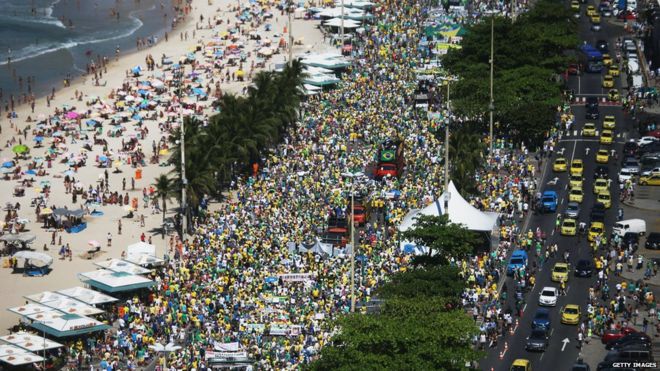By Kaitlyn Degnan
Impunity Watch Reporter, South America
BRASALIA, Brazil – Brazilian President Dilma Rousseff is struggling to maintain support amidst calls for her resignation following the conviction of Petrobras officials for organizing bribes to members of the Brazilian government in exchange for Korean contracts, paid out in funds stolen from the indebted oil company. Both the senate and the lower house are being investigated in the wake of the kickback scandal.

Rousseff served as chairwoman of Petrobras’ board in 2010, before her election to president and at the height of the kickbacks. Although she has officially been exonerated, many insist that she had to have had knowledge of the scheme. She has also been accused of receiving illegal contributions for her campaign, and that her government has misused state money to cover budget gaps.
President Rousseff has insisted that she will not resign.
Brazilians in past days have taken to the streets in protests, with many calling for the impeachment of President Rousseff. Protests drew thousands in Sao Paulo, Brasilia and Copacabana beach in Rio. The latest numbers list nation-wide support for the President to be as low as single digits (about 8 percent). Two out of three Brazilians surveyed think that Rousseff should be impeached, and her approval rating is currently the lowest of any Brazilian president since the end of military rule.
Protesters calling for impeachment do so despite the almost guaranteed instability that would follow. Pedro Lopes Siqueira, a public servant from Rio participating in the protests told the New York Times: “Impeachment would be momentarily destabilizing, but it’s allowed in the Constitution, and it needs to happen.
Some have even declared that they would welcome a military intervention as opposed to what is perceived by some as a highly corrupt government. Brazil recently celebrated 30 years since the end of the military dictatorship in March of this year.
This comes at a time where the Brazilian economy is struggling due to uncertainty and political corruption. Moody’s Investors Service reported that the Brazilian economy will contract about 2 percent this year. Businesses from motor vehicle manufacturers to small businesses and family owned restaurants have felt the effects of the economic downturn.
Business owners around the country have expressed concern regarding the potential repercussions if Rousseff is impeached – which will likely include a period of economic instability. Although business leaders and Rousseff historically have a rocky relationship, many have come out as unlikely allies of the president. “An impeachment is a traumatic affair that affects the political and business arena at a time when Brazil is struggling to regain its credibility abroad,” according to Alencar Burti, president of the Sao Paulo state Federation of Chambers of Commerce. The group represents 200,000 business owners in the area. They would be more in favor of some sort of economic deal.
Industrial groups and the media have also called for a deal to ensure stability.
For more information, please see:
BBC – Brazilian protesters call for President Dilma Rousseff’s impeachment – 17 August 2015
Bloomberg Business – Brazil’s Political Crisis Puts the Entire Economy on Hold – 17 August 2015